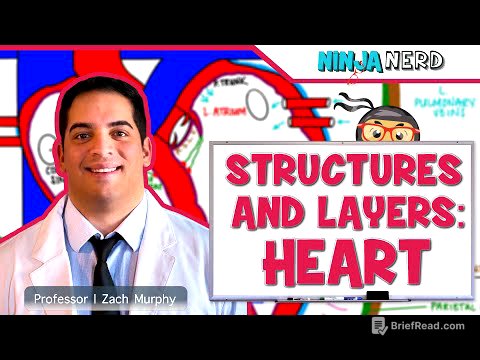TLDR;
Alright, so this whole conversation with Dr. Roger Seahol is about how to live your best life by focusing on eight key things. He calls them the "eight pillars of health". It's not just about eating your veggies and hitting the gym, but also about sunlight, water, air, rest, and even faith.
- Sunlight is super important for your mitochondria, the powerhouses of your cells.
- Water, especially hot and cold therapy, can boost your immune system.
- Trust and faith can help you deal with stress and anxiety.
What Is Roger Aiming to Accomplish? [2:12]
Dr. Seahol wants to give people easy-to-understand tools for living their best and healthiest lives. He's a lung and critical care specialist, so he deals with folks who are really sick in the ICU. This gives him a unique view on what keeps people from getting that ill in the first place and how to make life longer.
The 8 Pillars of Health [3:13]
Dr. Seahol introduces eight pillars of health that can help strengthen your body's organ systems. These pillars include nutrition, exercise, water (specifically hot and cold therapy), sunlight, temperance (avoiding toxins), air, rest, and trust/faith. He explains that medications often have side effects, and the goal is to use these pillars to support the weakest organ system in your body. Exercise, for example, has "side benefits" like reducing stroke and depression.
Story of Henry: A Fungal Lung Disease Patient [8:58]
Dr. Seahol shares a story about a 15-year-old boy with blood cancer who developed a flesh-eating fungal infection in his lung. Doctors were about to give up, but the boy asked to go outside. After spending time in the sun, his condition improved dramatically. This made Dr. Seahol realise how important sunlight is for health.
Why Our Mitochondria Need Sunlight [20:25]
Dr. Seahol explains that many chronic diseases are rooted in mitochondrial dysfunction, where the "batteries" in our cells don't work as well as we age. Sunlight, specifically infrared light, can penetrate deep into the body and stimulate mitochondria to produce melatonin, which acts as a cooling system to prevent oxidative stress.
Sunlight and Viruses: Impact on COVID-19 [27:31]
Dr. Seahol discusses how the SARS-CoV-2 virus interacts with the ACE2 receptor, which is involved in mitigating oxidative stress. He suggests that people with chronic diseases and mitochondrial dysfunction were more vulnerable to COVID-19 because their "engines" were already running hot.
Vitamin D and Lower Risk in COVID Patients [29:45]
Dr. Seahol notes that people with higher vitamin D levels tended to do better with COVID-19. However, giving vitamin D supplements didn't have the same effect. He believes vitamin D levels were a marker for people who were getting more sunlight and therefore more infrared radiation, which benefits mitochondrial health.
Benefits of Using Infrared Light Devices [33:40]
Dr. Seahol mentions that red light devices can improve mitochondrial efficiency. Red light can penetrate the skin and activate mitochondria in fibroblast cells, which produce collagen. A study in Brazil showed that COVID-19 patients who wore jackets with infrared LEDs had shorter hospital stays.
Could More Sunlight Help You Live Longer? [47:35]
Dr. Seahol references a Swedish study that followed women for 20 years and found that those who spent more time in the sun had lower mortality rates from cancer and cardiovascular disease. He also mentions a UK Biobank study with similar findings.
Does the Sun Really Cause Melanoma? [51:05]
Dr. Seahol addresses the concern that sun exposure causes skin cancer. He cites the UK Biobank study, which found no increased risk of melanoma but a reduction in non-skin cancer mortality.
Are Humans Meant to Live Outside? [54:22]
Dr. Seahol suggests that humans were born to be outside, noting that Americans spend 93% of their time indoors. He points out that being outside also encourages exercise and exposure to beneficial air and tree aromas.
Is It Worth Wearing an Infrared Light Mask? [57:16]
Dr. Seahol says that if you're already getting enough infrared light from the sun, these devices might not be as effective. However, if you can't get enough sunlight, they can be a reasonable alternative.
How to Get Infrared Light on a Cloudy Day [59:16]
Dr. Seahol explains that even on cloudy days, you'll get more infrared light outside than inside. He notes that modern light bulbs emit a narrow spectrum of light, lacking the full spectrum of natural light.
Optimal Time of Day to Get Sunlight [1:07:59]
Dr. Seahol recommends getting sunlight in the mornings and evenings when the sun is lower in the sky, as this provides more infrared light and less ultraviolet radiation.
Circadian Rhythm and Light Exposure [1:09:19]
Dr. Seahol explains that for circadian rhythm regulation, it's important to maximize light exposure through the eyes.
Benefits of SAD Light Therapy [1:11:13]
Dr. Seahol recommends SAD (Seasonal Affective Disorder) lights, especially in the morning, to help set your circadian rhythm and reduce depression.
Can Looking Through a Window Help Circadian Rhythm? [1:12:47]
Dr. Seahol says that looking at the sun through a window isn't as effective as going outside, as windows reduce the amount of light and may be designed to block infrared light.
Why Should We Avoid Bright Screens at Night? [1:14:56]
Dr. Seahol stresses the importance of darkness at night. Bright screens can shut down melatonin production and confuse your circadian rhythm.
Should the Bedroom Be Completely Dark at Night? [1:17:16]
Dr. Seahol recommends making your bedroom as dark as possible, avoiding nightlights and LED displays.
Do Vitamin D Supplements Work? [1:19:08]
Dr. Seahol says vitamin D supplements do work and can lower the risk of acute chest syndrome and autoimmune conditions.
Possible Consequences of Vitamin D Overdose [1:20:59]
Dr. Seahol advises getting your vitamin D levels checked, as it's possible to take too much, which can affect calcium metabolism.
The Role of Vitamin D in the Body [1:21:47]
Dr. Seahol explains that vitamin D is a lipid-soluble molecule that can affect DNA transcription, impacting calcium metabolism and the immune system.
Do Cravings Signal Nutrient Deficiencies? [1:23:45]
Dr. Seahol isn't sure if cravings signal specific deficiencies, but he notes that people who don't get enough sleep tend to crave carbohydrate-rich foods.
Water’s Role in the Body [1:25:20]
Dr. Seahol shifts the focus to the external use of water, particularly its effect on body temperature and the immune system.
Interferons and the Innate Immune System [1:27:05]
Dr. Seahol explains that the innate immune system is the body's first line of defense, with interferon as a major player. Interferon production increases with temperature, which is why fevers are important for fighting viral infections.
Importance of Hydration for Fighting Infections [1:32:37]
N/A
Should We Use Hot and Cold Therapy Together? [1:34:20]
Dr. Seahol says that hot therapy, like saunas, can induce artificial fevers and improve the interferon response. Cold therapy at the end can cause vasoconstriction, helping to keep the core body temperature higher for longer and kick white blood cells into circulation.
Impact of Tree Aromas on Immunity [1:35:55]
Dr. Seahol mentions that trees give off aromatic compounds called phytoncides, which can interact with our immune system and make us more relaxed.
Do Indoor CO₂ Levels Matter? [1:38:29]
Dr. Seahol confirms that high CO2 levels can negatively impact cognitive performance.
How Can We Optimize Indoor Air Quality? [1:39:15]
Dr. Seahol recommends cracking open windows or doors to improve ventilation and reduce CO2 levels.
Faith as a Way to Deal With Stress and Anxiety [1:40:22]
Dr. Seahol discusses the growing body of evidence that people with faith are better able to deal with stress and anxiety.
Conditional vs. Unconditional Forgiveness and Stress [1:42:27]
Dr. Seahol references a study that found people who forgive unconditionally have less depression and anxiety. This is often linked to a belief that God has forgiven them.
Are People Who Believe in God Generally Healthier? [1:45:40]
Dr. Seahol suggests that people with a healthy relationship with their faith are associated with less disease.
Roger’s Experience Witnessing Death [1:47:19]
Dr. Seahol shares that he's often present at the end of people's lives and has seen people choose death over artificial interventions.
A Miraculous Story: Anoxic Brain Injury Recovery [1:48:59]
Dr. Seahol recounts a story about a young man who suffered an anoxic brain injury but miraculously recovered, which taught him to be humble about what we know in medicine.
Should Hospital Patients Be Taken Outside? [1:59:02]
N/A
Are Melatonin Supplements Good for Sleep? [1:59:42]
Dr. Seahol says melatonin supplements can be beneficial for falling asleep, shifting your circadian rhythm, and jet lag, but he doesn't recommend routinely taking large doses.
Side Effects of Melatonin Supplements [2:00:30]
Dr. Seahol notes that high doses of melatonin can make you more irritable.









